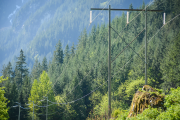British Columbia’s updated climate plan, the CleanBC Roadmap, promises to take important steps to close the gap between the province’s 2030 emissions reduction target and its plan to get there.
Success will depend on implementation. How will the province transition to zero-carbon buildings, put more zero-emission vehicles on the road, and reduce emissions from industry?
Join our panel of experts as we provide an overview of B.C.’s plan and examine how it will deliver on ambitious goals.
Register today to join us on Thursday, Nov. 18 at 11 a.m. Pacific. Panelists include:
- Tom-Pierre Frappé-Sénéclauze, director of buildings and urban solutions, Pembina Institute
- Colton Kasteel, senior analyst, Pembina Institute
- Ian Bruce, deputy executive director, David Suzuki Foundation
- Karen Tam Wu, B.C. regional director, Pembina Institute (moderator)
The B.C. government released the CleanBC Roadmap in late October on the heels of a devastating summer in B.C., a federal election where climate was top of mind for Canadians, and just before global leaders gathered in Glasgow to discuss collective action to combat climate change. For over a decade, B.C. has been at the leading edge of climate action and an example for many jurisdictions across Canada and around the world, being one of the first to put a price on carbon in 2008 and introducing ambitious requirements for zero-emission vehicles and renewable fuels in 2018.
British Columbians are already paying the escalating financial and human costs of climate change. It’s time to accelerate action to tackle the highest-emitting sectors (transportation at 37 per cent, oil and gas at 21 per cent, and buildings at 13 per cent of the province’s total emissions, respectively).
Failure to ramp up the most high-impact policies will result in even higher costs for generations to come. Join our panel of experts on Thursday, Nov. 18 as they discuss what’s needed to meet the province’s goal of reducing carbon pollution by 40 per cent by 2030 and achieve net-zero emissions by 2050.










